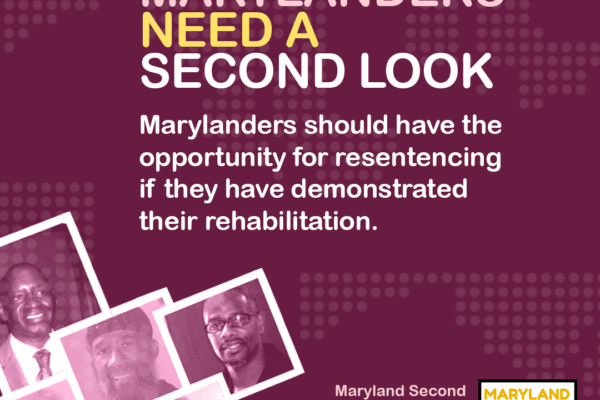2/1 Hearing on SB 123; 2/13 Hearing on HB 724; Quotes Included Below
ADVISORY FOR: Thursday, Feb 1, 2024
CONTACT: Meredith Curtis Goode, 443-310-9946, media@aclu-md.org
WHAT: Hearing in the Senate Judicial Proceedings Committee.
WHO: Several Marylanders who have earned release from extreme sentences, including Nathaniel Foster, Anthony Muhammed, and Alonzo Turner-Bey; Magdalena Tsiongas, Convenor of the Maryland Second Look Coalition; Martina Hazelton, Founder of the Lifers Family Support Network; Alexandra Bailey from the Sentencing Project; Yanet Amanuel, ACLU of Maryland, public policy director; and more.
WHEN: Thursday, February 1, 2024 at 1 PM.
WHERE: Senate Judicial Proceedings Committee, Miller Senate Office Building, 11 Bladen St., Annapolis, MD.
ANNAPOLIS – The American Civil Liberties Union (ACLU) of Maryland, along several directly impacted people and partner organizations, on Thursday, February 1 will testify in support of Senate Bill 123, the Maryland Second Look Act, which would create a more meaningful avenue for release for those who have demonstrated their rehabilitation.
Maryland incarcerates the highest percentage of Black people in the country, at 71 percent of our prison population, more than twice the national average. Shamefully, Maryland also leads the nation in sentencing young Black men to the longest prison terms, at a rate 25 percent higher than the next nearest state – Mississippi.
Senator Jill Carter, sponsor of the SB 123, the Maryland Second Look Act: “If we’re serious about addressing Maryland’s mass incarceration problem, we have to create more meaningful avenues for release for those who have demonstrated their rehabilitation. Disturbingly, Maryland’s prison system is filled with Black people who were excessively sentenced or denied parole based on ‘superpredator’ mythology. A broad ‘second look’ provision ensures that, decades later, sentences can be reviewed based on our current understanding of fairness and racial justice. This bill is particularly important because it’s a fix to an unjust rule change made in 2004.”
Magdalena Tsiongas, convenor of the Maryland Second Look Coalition, said: “The Maryland Second Look Act would provide hope for incarcerated people, who have served decades behind bars, and their families, at reunification. Passage of the bill would show a commitment and belief in rehabilitation and growth, over merely punishment.”
Martina Hazelton, co-founder, Family Support Network, said: “Redemption is possible. Meaningful second chances for incarcerated persons that have demonstrated change and are most deserving should be accessible and obtainable. The Maryland Second Look Act is a step toward justice reform that is needed and necessary in a state that leads the country in the incarceration of Black and Brown persons.”
Yanet Amanuel, public policy director for the ACLU of Maryland, said: “We have the opportunity now to move our state away from the disgraceful reality of rampant racial injustice in our legal justice system. The Maryland Second Look Act would create a pathway to revisit extreme sentences, with increased awareness of the impact of racially targeted policing and heightened penalties, so that more Black and Brown Marylanders who have demonstrated their rehabilitation can earn release.”
The Maryland Second Look Coalition is working to pass SB 123 and HB 724, which seeks to address the state’s extreme race disparities and advance public safety by allowing people serving extreme sentences who have served at least two decades the opportunity to petition the court to modify or reduce their sentence based on their demonstrated rehabilitation. This evidence-based initiative recognizes the transformative potential of focusing on rehabilitation and the urgency of addressing racial justice in our criminal legal system.
Related Content

Advocates Celebrate Passage of Second Look Act, Urge Continued Push for Justice
Stay Informed
Sign up to be the first to hear about how to take action.
By completing this form, I agree to receive occasional emails per the terms of the ACLU’s privacy statement.
By completing this form, I agree to receive occasional emails per the terms of the ACLU’s privacy statement.


